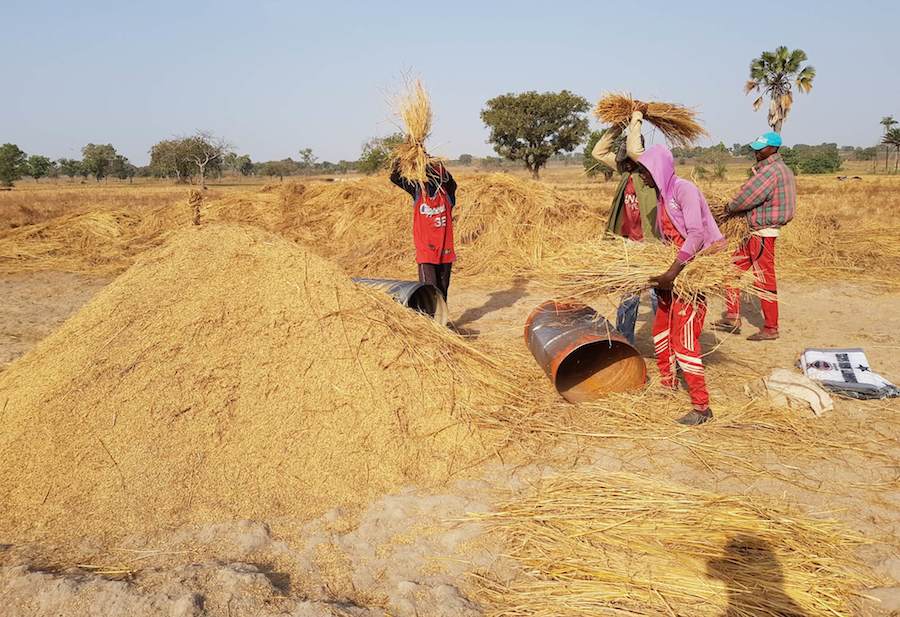Nigeria’s rice industry, once heralded as a flagship success of local production, is now facing significant challenges as local output declines and prices rise. For the first time in the country’s history, the cost of rice has surpassed the N100,000 threshold.
Over the past few years, various policies encouraged significant local output, including initiatives by the Central Bank of Nigeria (CBN) to boost rice farming through programmes like the Anchor Borrowers’ Programme. This produced as much as 8.4 million metric tonnes of paddy rice in 2021, securing Nigeria’s position as West Africa’s leading rice producer. Yet, several factors, including the devaluing of the local currency, security concerns, the and reopening of the borders, to name a few, have destabilised these gains, reintroducing smuggling and intensifying competition from cheaper imported rice.
According to the director-general of the Rice Processors Association of Nigeria (RIPAN), Andy Ekwelem, smuggling from neighbouring countries like Benin Republic has dramatically increased. Thailand’s exports surged from 5,000 metric tonnes (MT) per month in 2019 to nearly 27,000 MT by 2022. This influx of foreign rice has undercut local producers, leading to a decline in domestic production. Farmers and processors, once shielded by import restrictions, now struggle to compete, causing a significant reduction in the volume of paddy rice taken up by Nigerian processors.
This decline in production is accompanied by a growing gap between rice demand and supply. Rice consumption in Nigeria continues to rise, driven by a growing population. AFEX’s Wet Season Crop Production Report for 2023 estimates a supply gap of 2 million MT annually, contributing to a sharp increase in rice prices. In 2023 alone, prices surged by over 37 percent, with a bag of rice climbing from ₦28,000 in 2022 to ₦42,000 in 2023. As of October 2, 2024, in comparison to the 2023 price of a 50kg bag of rice, the price has soared by a ratcheting 150 per cent to N105,000.
For rice dealers and consumers alike, the consequences are stark. Dealers report declining sales as customers reduce purchases, struggling with the inflated costs. “I don’t have much rice because of the price increase,” one dealer, Mama Nkechi, lamented, while another, Abdulahi Mohammed, noted that “customers are not coming like before.”
The deputy chairman of the All-Farmers Association of Nigeria (AFAN), Lagos chapter, Mr. Shakin Agbayewa, disclosed that local rice production can only meet 57 per cent of Nigeria’s annual rice consumption of 6.5 million metric tonnes. Speaking in Lagos, Agbayewa highlighted the challenges facing the sector, including dishonest practices such as repackaging local rice in foreign bags to sell at a premium, a phenomenon he referred to as “internal smuggling.”
“We have a major problem with locally grown rice, which we call ‘internal smuggling.’ Local rice cultivators rebag home-grown rice in foreign bags to sell at a higher price. This practice, driven by a lack of honesty, is partly responsible for the rising cost of rice,” Agbayewa stated. He further stressed that with transparency and improved practices, Nigeria could meet its rice consumption needs. “If all parameters are equal, local rice farmers will be able to meet the demand for home-grown rice,” he said.
Despite recent progress due to the border closure implemented by the past administration, Nigeria still faces a 43 per cent shortfall in rice production. Agbayewa underscored the need for reforms to close this gap and meet the country’s growing demand for rice.
Supporting this position, chairman of the Lagos State chapter of the Rice Farmers Association of Nigeria (RIFAN), Mr. Raphael Hunsa,called for more concerted efforts to boost local rice production. He emphasised the need for the involvement of all stakeholders, particularly the youth, to improve output.
Hunsa noted that the Lagos State rice mill in Imota, which can produce 33,000 metric tonnes of rice per hour, is currently underutilised due to a shortage of locally- grown paddy rice. “The government needs to support local farmers and reduce reliance on northern states for paddy,” he urged, adding that more initiatives are needed to attract farmers to the sector and meet the increasing demand for rice.
The ongoing supply issues have had a significant impact on rice prices. According to AFEX’s 2023 Wet Season Crop Production Report, rice prices are expected to rise by around 32 per cent in 2024 due to stagnant production, which is estimated to grow by just 3.2 per cent this year.
Other combination of factors has exacerbated this situation, notes development economist at Adeleke University, Professor Tayo Bello. He stated that in addition to the surge in imports, local production has been hampered by extreme weather events, notably flooding during the wet season, which severely impacted yields. He also cited that input costs have also soared, with inflation raising the prices of seeds, fertilizers, and other essentials by 30-40 percent, making it harder for smallholder farmers to maintain or increase their production.
Richard Ogundele, an agriculture business expert, highlighted that Nigeria, which met 84 per cent of its rice demand in 2016, is now far from self-sufficient, stressing that insecurity in key agricultural regions, limited mechanisation, and the failure to optimise both farming seasons are further weakening local output.
Not surprisingly, despite being West Africa’s largest rice producer, Nigeria still finds itself reliant on imports to meet its growing consumption needs. A rice importer, Sola Ogundipe, cites that the situation is compounded by global factors that have driven rice prices to a 12-year high. He said India’s recent ban on rice exports and adverse weather conditions in other major rice-producing countries like Vietnam have tightened global supply, further driving up prices.
Hence, financial economist at University of Nigeria, Dr. Godwin Imeobi prognosticates that Nigeria’s increasing dependency on imported rice will ratchet up the price of the commodity as the local currency continues to lose value against the currencies of rice-producing nations.
It is noteworthy that despite the testing of several policies by the Central Bank of Nigeria to stabilise the local currency, it has proven futile, with the naira trading with the USD at N170/$ in recent days. Hence, Silas Muokhudo, a rice importer in Lagos told NATIONAL ECONOMY that the price of a 50kg bag of rice may cost as much as N120,000 by December 2024. Making jest of the prevailing situation, he quipped that in the coming year, it may cost a minimum wager two months’ salary to be able to purchase a bag of rice in 2025.
It is worthy of note, also, that the pronouncement by the Bola Tinubu administration to suspend duties and tariffs on commodities such as rice in August has had little or no impact on the cost of the commodity.
A lecturer, Dr. James Olaleye, on his part, noted that Nigeria’s path forward requires a reassessment of both its agricultural policies and market protections. He said while previous efforts under the Buhari administration spurred local production, the current environment of open borders, unchecked smuggling, and weak infrastructure threatens to undo those advances. “Without stronger measures to protect local rice farmers, increase mechanization, and ensure year-round farming, the country risks deepening its dependency on expensive imports, further straining an already fragile economy,” he said.
For a nation that has spent over $15 billion on rice imports in the last decade, the situation underscores the need for a robust, strategic response. Reviving local rice production is not only vital for economic growth but also critical for food security in a country where rice is a staple for millions of people.





